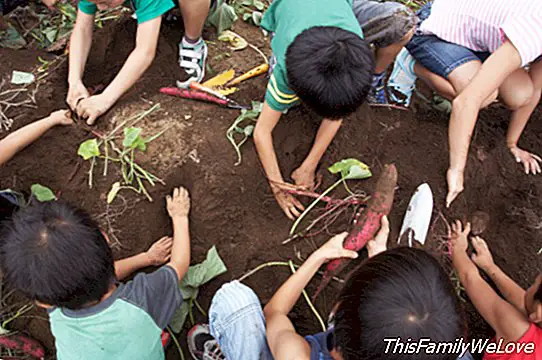Five tips to teach solidarity to children


Educate in values It is essential: we need today's children to be good adults tomorrow, and that is only achieved through a good education centered on those most important values that the family can transmit. Coinciding with the Day of Solidarity, we take the opportunity to remember some tricks so that our children can be supportive.
What is solidarity
We can define the Solidarity as the capacity of the human being to feel empathy for another person and, thus, help her when she needs it (especially in difficult moments). In Ethical Values, they define it as "a feeling of unity in which common goals and interests are sought".
In essence, it is a value that needs to be cultivated, especially in societies where individualism reigns and at times it seems that others forget their neighbors. "Solidarity allows the development of modern families or population centers, generating a sense of group improvement ", continue in Ethical Values.
This value, that feeling, makes we all unite with the same goal, that we help each other, which is essential. As well conclude in Ethical Values: "In modern societies, each person develops in a personal way, but to survive in society you need other people, and that is where solidarity does its work, allowing the collective forces in favor of a common good ".
Educate solidarity at home
If you want your children to be supportive, learn (and apply) these key tips. It is not difficult, but it is not simple either: it is a task that must be cultivated in our day to day, with determination and encouragement.
1. Example We have said it many times: children see, children do. It is essential that solidarity is practiced every day at home, and that parents are the first to carry this important value "by flag": with their brothers, children, neighbors, colleagues or even with strangers. Seeing a supportive attitude on a daily basis will make children learn it from the start.
2. Share from small. All the little ones go through the time of "mine". It is essential to teach him to share also at that time: "Yes, even if the toy is yours, you can share it with your cousin or your little friend in the park, because he now has none and if he does not get sad". Rewarding this kind of behavior will also reinforce the idea of solidarity.
3. Empathy. Working with children's empathy is also necessary if we want them to be supportive, since solidarity is a way of putting oneself in the place of the other. Teaching them to worry about others when they are sad or sick, to help their classmates with homework or class assignments, etc., are small steps that will make a difference.
4. Reality Another way to be supportive is to know your own reality, but also that of other children with less luck. Explain that there are children who do not have what they, who suffer from serious needs and that it is our responsibility to help them.
5. Give away. If that stuffed animal is no longer used, nor that book has already been read, if that trouser is too small ... at home we accumulate many objects that other people need. Although it is true that many times it "hurts" to separate from objects that have been special, it is good to give them to others who will really use them, and teach our children that they should feel good because their toy will make another child happy.

Teach solidarity in the classroom
María Buxarrais, Full Professor of the Faculty of Pedagogy of the University of Barcelona, indicates in this article for the Organization of Ibero-American States for Education, science and culture these methods as the best ones to teach solidarity in class:
- The conflict of values, element conducive to learning. We know that learning takes place in a meaningful way when we actively build our own knowledge, our values. Hence, the need to involve students in activities that have interest and meaning so that they can respond and commit to what they are learning. Conflicting issues will be considered through dialogue based on good reasons.
- Cooperation and participation in the classroom, cooperative activities favor the development of certain attitudes such as solidarity. Students help each other learn, share ideas and resources, plan the study. The teacher plays a mediator role and makes students participate in their learning process.
- Moral education strategies: The use of moral education techniques or strategies are indispensable for work in attitudes such as solidarity.For example, the clarification of values, the discussion of moral dilemmas, the diagnosis of situations, the critical understanding of texts -about the media-, social skills exercises and self-regulation of behavior, etc. they contribute to implant or reinforce certain attitudes and values in the students.
- Commitment and involvement: It is very important to encourage students to make decisions and participate in concrete actions that affect their immediate environment, whether from the school, the neighborhood, or local. Nor should we forget to undertake actions in the face of broader problems, national or international, through our participation in campaigns or supporting cooperation projects. The best way to educate solidarity is to practice it.
- Joint activities in the center. Ephemeris such as Human Rights Day, etc. visits to exhibitions, participation in workshops or specific activities, telematic debates, radio programs, human chains, school correspondence and exchanges with centers of Third World countries, solidarity campaigns, joint work of the whole center (Solidarity Week), organization of exhibitions, theater, book samples, center magazine, etc.
- Landmarks: We must start from events and problems in the classroom and the center. For example: fights in class, how to organize to live together, how to cooperate together in class, etc .; Social and ethical problems: discrimination against immigrants, violation of human rights, etc .; Collective problems: a campaign of solidarity with a country or with certain social groups, the social life of students: family problems, leisure in the neighborhood or town, etc., press news and commemorations: the day of human rights, activities of NGO.
Angela R. Bonachera




